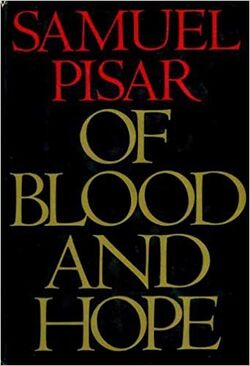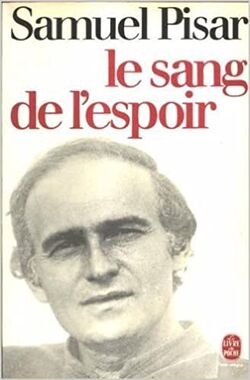Samuel Pisar (M / Poland, 1929-2015), Holocaust survivor
Samuel Pisar (M / Poland, 1929-2015), Holocaust survivor.
- KEYWORDS : <Poland> <Bialystok Ghetto> <Majdanek> Other camps <Auschwitz>
- MEMOIRS: Of Blood and Hope (1979; ET 1980)
Biography
Samuel Pisar was born into a wealthy Jewish family in Biaystok, Poland. Forced with his family in the ghetto. His father was tortured and shot by the Gestapo for smuggling some children into the Aryan zone. With the liquidation of the Ghetto he remained alone and survives in many different camps. He was sent to Majdanek, Bliżyn, Auschwitz, Sachsenhausen, Oranienburg, Dachau and ultimately to the Engelberg Tunnel near Leonberg. At the end of the war, he escaped during a death march. After the liberation, Pisar spent a year and a half in the American occupation zone of Germany, engaging in black marketeering with fellow survivors. He was rescued by an aunt living in Paris. An uncle sent him to Melbourne, Australia, where he resumed his studies and became a lawyer, moving back to France and the United States.After the war he was involved for some time in the black market in Germany.
Book : Of Blood and Hope (1979; ET 1980)
- Le sang de l'espoir <French> (Paris: Laffont, 1979). English trans. Of Blood and Hope (Boston : Little, Brown, 1980).
"A survivor of Auschwitz recounts his harrowing experiences, his adjustment to freedom, and his work on behalf of the Jewish cause."--Publisher description.
New York Times (28 July 2015)
- Samuel Pisar Dies at 86; Lawyer and Adviser Survived Nazi Camps, by Steven Erlanger
Samuel Pisar, who survived Auschwitz as a boy to become a successful lawyer, an adviser to presidents and the creator of the text for Leonard Bernstein’s symphony “Kaddish,” died on Monday in Manhattan. He was 86.
His daughter Leah Pisar-Haas said the cause was pneumonia after a stroke.
Mr. Pisar had an extraordinary life that arced from Bialystok, Poland, where he was born on March 18, 1929, through the Nazi death camps, and on to education in Australia, at Harvard and at the Sorbonne.
He was 10 when Poland was swallowed by Hitler and Stalin. He somehow survived the camps of Majdanek, Auschwitz and Dachau, emerging at 16, hardened and wild, his family gone to ash.
He spent a year and a half with older survivors as a hooligan and black marketeer in the American occupation zone of Germany, living high for revenge, riding a liberated BMW motorcycle and selling Lucky Strikes and used coffee grounds stolen from the kitchens of the American occupying troops, re-roasted and repackaged for the Germans.
Mr. Pisar was rescued by a French aunt, and with the help of uncles in Australia he slowly created a life of manifold accomplishments: becoming an adviser on foreign economic policy to John F. Kennedy, whom he met at Harvard, and a confidant to Presidents François Mitterrand and Valéry Giscard d’Estaing of France; advocating détente between the Soviet Union and the West through trade; and establishing himself as a lawyer to corporate executives and movie stars like Rita Hayworth and Elizabeth Taylor.
He became a citizen of the United States by an act of Congress and had homes in New York and Paris. The French government made him a Grand Officer of the Legion of Honor and an Officer of Arts and Letters. The Polish government made him a Commander of the Order of Merit.
Mr. Pisar, pressed to confront his carefully hidden demons by his second wife, Judith, and his children, wrote a memoir in 1979, “Of Blood and Hope,” a saga of the nearly unspeakable, of survival and self-recovery. “I couldn’t move around any more like a shadow,” he said, “with all these taboos.”
In a series of interviews with The New York Times in 2009, he described how he had survived the death camps by becoming pitiless and cruel, finding older protectors and ways to appear privileged in a hierarchy of despair, like persuading a prisoner-tailor to refashion a cap so that the stripes on the top perfectly met the stripes on the side. He was condemned to die at least twice, but managed to slip back into the general prison population, once convincing a guard that he was there only to wash the floor.
“I had to learn bad habits,” he said, “to be good at lying and make instant judgments about people, what they were saying, what they really thought, and not just the guards and torturers, but my fellow prisoners, too. I was a cute kid, and there were a lot of psychotics around.”
At the end of the war, he escaped during a death march.
But to rejoin the world, “I had to wipe out the first 17 years of my life,” he said. “I muted the past” and “turned to the future with a vengeance.”
Years later, having been pressed by his wife’s friend Leonard Bernstein, Mr. Pisar, like Job, took his arguments to God. Mr. Bernstein, always unhappy with the lyrics of the “Kaddish” Symphony No. 3 he wrote in 1963 and dedicated to the assassinated President Kennedy, asked Mr. Pisar to write them instead. Mr. Pisar refused, feeling that his talents were not equal to the music.
But after Mr. Bernstein’s death, in 1990, and prompted by the terrorist attacks of Sept. 11, Mr. Pisar finally accepted the task, writing a version of the Kaddish, the Jewish prayer for the dead, first performed in 2003 with the Chicago Symphony Orchestra.
Mr. Pisar called it “A Dialogue With God,” and he kept refining the text.
With the same “visceral voice I once raised against you as a skeletal kid” at the edge of the gas chamber, he demands of God: “Why do You abandon us? How can You allow such carnage? Do You even care?”
He described Jews heading for the gas chambers “with Your name on their lips,” and said that that imposed obligations on God, too. “The Auschwitz number engraved on my arm reminds me of it every day,” he said. “And today, Father, I remind You!”
He said he was no longer furious with God. But pressed, he said: “I’m angry. And he may not even be there. But I love him, too. Because we have loved him for so many thousands of years.”
A highlight for Mr. Pisar was the ability to perform his Kaddish in Israel in 2009, to a hushed audience at Yad Vashem, the Holocaust museum. The concert was a memorial to the victims of the Warsaw ghetto, and it was also, to his daughter Ms. Pisar-Haas, a sort of homecoming. “It was so much more resonant there than elsewhere,” she said. “It was as if he was saying Kaddish for all the six million.”
Mr. Pisar also performed his Kaddish in Warsaw, and remained engaged in institutions dedicated to preserving the memory of the Holocaust. In 2012 he was named an honorary ambassador for Unesco and a special envoy for Holocaust education.
In a statement on Tuesday, President François Hollande of France said Mr. Pisar had “devoted himself to the vital obligation to transmit what he had lived and thus dedicated his singular life to the memory of those who experienced the horror of the Nazi camps.”
Vice President Joseph R. Biden Jr. said: “His success as a lawyer and statesman were only surpassed by the courage he showed in speaking of his Holocaust experience. He confronted not only the brutality of his experience but the person he had to become to survive.”
Mr. Pisar’s parents, David and Helena Suchowolski Pisar, and his younger sister, Frieda, died in the Holocaust.
Besides his daughter Leah, survivors include his wife; two other daughters, Helaina Pisar-McKibbin and Alexandra Pisar-Pinto; a stepson, Antony J. Blinken, who is a deputy secretary of state; and three grandchildren.
For all his success, Mr. Pisar liked to say, a feral child still lived haunted within him, mocking all his fitted suits, lovely furnishings and worldly renown.
“The little one with the sunken eyes and shaved head helps a lot,” he said. “He’s very severe with me; he disapproves of so many things; he’s a kind of conscience.”

